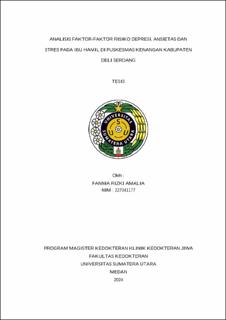| dc.description.abstract | Background: Mental disorders that occur during pregnancy such as depression, anxiety and stress can lead to adverse pregnancy and birth outcomes such as preterm birth, preeclampsia, maternal mood disorders, stunted fetal growth, low birth weight, developmental delays, and neonatal morbidity. Factors that contribute to the incidence of depression, anxiety and stress in pregnant women include obstetric, psychosocial and environmental factors. The DASS-21 is widely used worldwide in pregnant women linking depression, anxiety and stress by analyzing which components of emotional levels are elevated. The purpose of this study was to analyze the relationship of factors affecting depression, anxiety and stress in pregnant women at the Kenangan Health Center, Deli Serdang Regency.
Methods: This study is a multivariate analytic logistic regression predictive framework with a cross-sectional study approach. Sampling using Non-Probability sampling technique type consecutive sampling, this study analyzes the relationship between several independent variables (age, ethnicity, marital status, education level, employment status, economic status, parity, gravida, gestational age, history of SC, history of miscarriage, expected pregnancy, compliance with ANC and fetal growth that is monitored according to the curve) and dependent variables using the Indonesian version of the Depression, Anxiety and Stress Scales 21 (DASS-21) instrument. The research sample was pregnant women who came to control with a total of 220 subjects. and was conducted at the Kenangan Health Center, Deli Serdang.
Results: 220 pregnant women who came to control the MCH Poli Kenangan Health Center Deli Serdang found a significant relationship between age p = 0.001, economic status p = 0.034, parity = 0.036, gestational age p = 0.001 with the incidence of anxiety and there is a significant relationship between parity p = 0.013 and gestational age p = 0.001 with the incidence of stress in pregnant women who come to the Kenangan Health Center Deli Serdang.
Conclusion: There is a relationship between the variables of age, economic status, parity and gestational age with the incidence of anxiety and there is a relationship between the variables of parity and gestational age with the incidence of stress in pregnant women who come for control to the Kenangan Health Center, Deli Serdang. | en_US |


